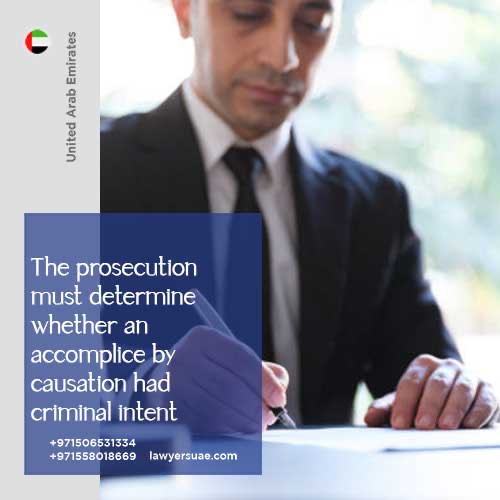Abetment refererer til forsætlig tilskyndelse, tilskyndelse, hjælp til eller lettelse af en anden persons begåelse af en forbrydelse. Det er en inchoate lovovertrædelse, hvilket betyder, at medarbejderen kan holdes ansvarlig, selvom den medvirkende forbrydelse aldrig rent faktisk blev begået. I De Forenede Arabiske Emirater (UAE) betragtes nedsættelse som en alvorlig forseelse med stejle straffe.
Der er tre primære typer nedsættelse: anstiftelse, sammensværgelseog bevidst hjælp.
Denne artikel har til formål at kaste lys over elementerne, typerne og implikationerne i den virkelige verden af støtte under strafferet i UAE
Elementer af Abetment
For at en handling kan kvalificeres som støtte, skal to nøgleelementer være opfyldt:
- Actus Reus (The Guilty Act): Dette refererer til de specifikke handlinger anstiftelse, engagement i sammensværgelse eller forsætlig medvirken. Actus reus er den fysiske del af en forbrydelse, såsom handlingen med at opmuntre nogen til at begå et røveri eller give dem midlerne til at gøre det.
- Mens Rea (The Guilty Mind): Medvirkeren skal have til hensigt at fremprovokere, hjælpe eller lette begåelsen af en strafbar handling. Mens rea refererer til det mentale element i en forbrydelse, såsom hensigten om at hjælpe nogen med at begå en kriminel handling.
Derudover er der generelt ikke noget krav om, at den medvirkede kriminalitet rent faktisk skal udføres med held for ansvar i henhold til støttelovgivningen. Medvirkeren kan retsforfølges udelukkende baseret på deres hensigt og handlinger for at fremme forbrydelsen, selv om selve forbrydelsen aldrig blev fuldført.
Typer eller former for forbedring
Der er tre primære måder kriminalitet bedring kan forekomme:
1. Anstiftelse
Defineret som direkte eller indirekte opfordrer, provokerende, tilskynde eller hverve en anden til at begå en forbrydelse. Dette kan ske gennem ord, fagter eller andre kommunikationsmidler. Anstiftelse kræver aktiv involvering og kriminel hensigt. For eksempel, hvis nogen gentagne gange fortæller deres ven om at røve en bank og giver detaljerede planer for, hvordan det skal gøres, kan de være skyldige i at anstifte forbrydelsen, selvom vennen aldrig følger op med røveriet.
2. Sammensværgelse
An aftale mellem to eller flere personer for at begå en forbrydelse. Betragtes ofte som den mest alvorlige form for bedring, sammensværgelse kræver blot aftalen, uanset eventuelle yderligere skridt eller handlinger. En sammensværgelse kan eksistere, selvom personerne aldrig rent faktisk udfører den planlagte forbrydelse.
3. Forsætlig hjælp
At yde assistance eller ressourcer som våben, transport, rådgivning, der bevidst hjælper med en kriminel handling. Forsætlig hjælp kræver aktiv medvirken og intention. Ansvaret gælder, selv om medarbejderen ikke er fysisk til stede på gerningsstedet. For eksempel, hvis nogen bevidst låner deres bil til en ven til at bruge i et planlagt røveri, kan de være skyldige i bevidst medvirken til forbrydelsen.
Abetment vs. den faktiske kriminalitet
Det er vigtigt at skelne mellem en medhjælper og hovedforbryder der direkte begår forbryderen handle:
- Forbrydere betragtes som medvirkende til forbrydelsen, mens hovedforbryderen er den primære gerningsmand, der direkte udfører den kriminelle handling.
- Både medhjælpere og rektorer kan stå over for kriminelle straffemændt & bøder. Dog får voldsmænd generelt mildere straffe sammenlignet med de hovedforbrydere, der direkte begik forbrydelsen.
- At bevise en årsagssammenhæng (nærliggende årsag) mellem medvirkerens handlinger og den efterfølgende forbrydelse er nøglen til at fastslå ansvar. Anklagere skal påvise, at medvirkerens tilskyndelse eller bistand direkte har bidraget til begåelsen af forbrydelsen.
Straf for Abetment
Sværhedsgraden af straffen for tilskyndelse varierer afhængigt af sagens omstændigheder:
- Hvis den medvirkende lovovertrædelse faktisk er begået, risikerer voldsmanden lige stor straf som den hovedforbryder, der direkte udførte forbrydelsen. For eksempel, hvis medarbejderen hjalp med at planlægge et mord, og mordet blev udført med succes, kunne medvirkeren stå over for samme straf som den person, der begik mordet.
- Hvis forbrydelsen var forsøgt men ikke afsluttet, straffen varierer afhængig af tyngdekraften af lovovertrædelse. Almindelige sætninger inkluderer:
- bøder
- Op til 10 år i fængsel
- Dødsstraffen som straf anvendes i visse ekstreme tilfælde af bekæmpelse.
Forsvar mod anklager om nedsættelse
Mens tilskyndelse betragtes som en alvorlig lovovertrædelse, eksisterer der adskillige juridiske forsvar, som en erfaren kriminel forsvarsadvokat kan anvende:
- Mangel på påkrævet hensigt eller viden: Hvis medvirkeren ikke havde til hensigt at hjælpe eller opmuntre til forbrydelsen, eller var uvidende om handlingernes kriminelle karakter, kunne dette være et forsvar.
- Tilbagetrækning fra den kriminelle sammensværgelse: Hvis medvirkeren trak sig fra sammensværgelsen, før forbrydelsen blev begået, og tog skridt til at forhindre dens forekomst, kunne dette fratage ansvaret.
- Påberåbelse af tvang eller tvang: Hvis medvirkeren blev tvunget til at hjælpe eller tilskynde til forbrydelsen under trussel om skade eller vold, kunne dette tjene som et forsvar.
- Påvisning af mislykket nærliggende årsag mellem handlinger og kriminalitet: Hvis anklagerens handlinger ikke direkte bidrog til begåelsen af forbrydelsen, kunne dette svække anklagemyndighedens argumentation for at fastslå ansvar.
Forståelse af potentielle strategier og anvendelse af retspraksis er nøglen til at opbygge et effektivt forsvar mod anklager om støtte.
Eksempler i den virkelige verden på bekæmpelse
- Tilvejebringelse af intern viden, der hjælper med at planlægge et terrorangreb
- Opmuntre nogen over sociale medier til at begå vold mod en bestemt gruppe eller individ
- Oprettelse og distribution af "how-to"-vejledninger til fremstilling af ulovlige eksplosive enheder
- Hjælper med at skjule en eftersøgt flygtning for retshåndhævelsen ved at sørge for husly eller transport
- Køb af hackingværktøjer eller -software til en person med den hensigt at hjælpe dem med at begå cyberkriminalitet
Disse eksempler demonstrerer den brede rækkevidde og den virkelige verden af støttelovgivningen i UAE.
Konklusion
Forbrydelsen med tilskyndelse bør ikke tages let på i UAE. Opmuntring, tilskyndelse til eller medvirken til enhver kriminel handling medfører stejle sanktioner, selvom selve forbrydelsen aldrig blev udført med succes. En stærk forståelse af de specifikke elementer, typer af støtte, strafvedtægter og potentielle juridiske forsvar er afgørende for alle UAE-borgere for at undgå at blive viklet ind i disse komplekse love. At konsultere en erfaren straffeforsvarsadvokat tidligt kan betyde forskellen mellem at afsone år i fængsel eller helt at undgå retsforfølgelse.
Hvis du er blevet efterforsket, arresteret eller sigtet for en kriminel handling relateret til tilbedelse i UAE, er det afgørende at søge juridisk rådgivning med det samme. En kyndig advokat kan guide dig gennem den juridiske proces, beskytte dine rettigheder og sikre det bedst mulige resultat for din sag. Forsøg ikke at navigere i kompleksiteterne af støttelovgivningen på egen hånd - bevar juridisk repræsentation så hurtigt som muligt.
Din juridiske konsultation med os vil hjælpe os med at forstå din situation og bekymringer. Kontakt os for at aftale et møde. Ring til os nu for en hasteaftale og møde på +971506531334 +971558018669







